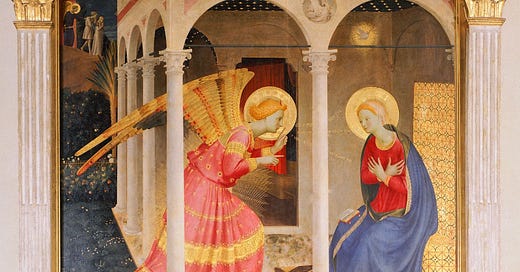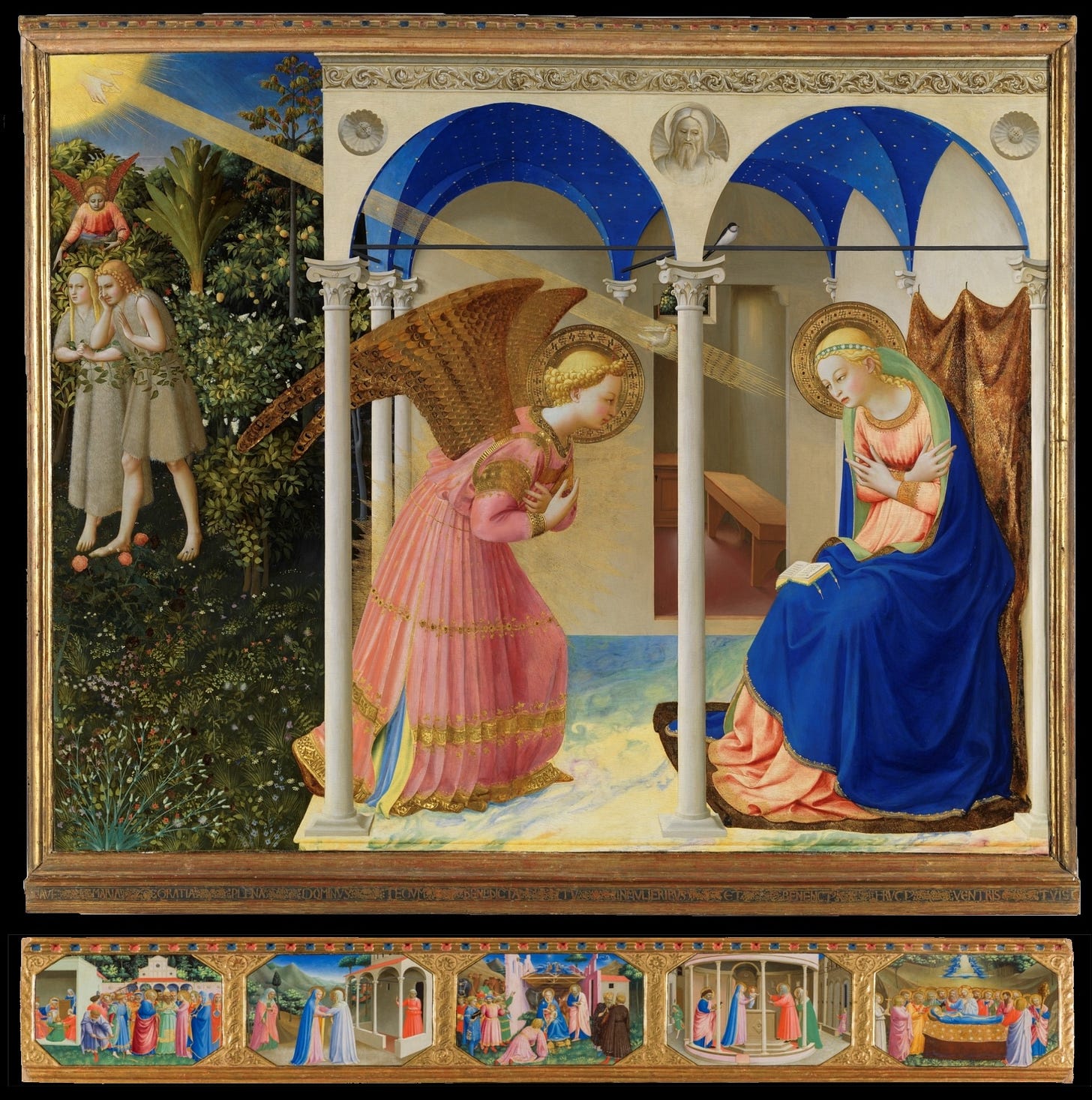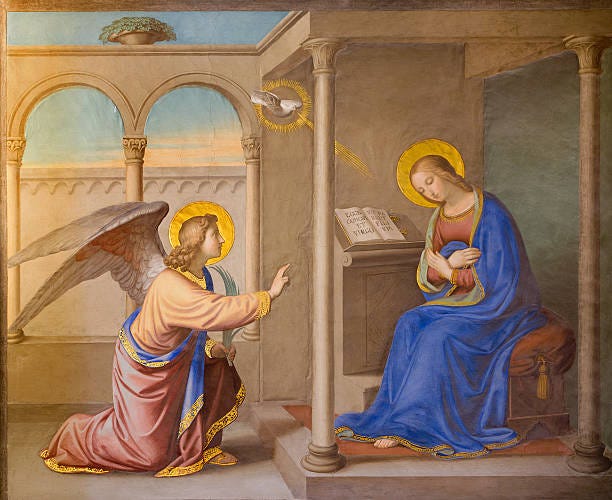The Archangel St. Gabriel is an interesting figure. Christians venerate him as the author of the “Angelic Salutation,” the one who announced the First Advent of our Lord and Savior Jesus Christ to the Blessed Virgin Mary. Even secularists usually remember him around Advent and Christmas time due to the familiar readings from Luke 1, and the popular hymn, “Gabriel’s Message.” However, something that’s always struck me is the fact that even non-Christian religions like Islam have tried to appropriate St. Gabriel to lend credibility to the claims of their “prophets.” For me, this not only begs the question of why false prophets would try to capitalize on St. Gabriel, but also why the Lord actually chose him in particular to be the first angel we meet in the (truly divinely revealed) New Testament. The answer to this question is not only profound, but also informative of the way that false religions attempt (and fail) to subvert true divine revelation.
In the Old Testament, it’s not uncommon to see angels making announcements; the New Testament certainly didn’t invent this concept. However, it is incredibly rare to see the angel being given a specific name. For example, in the angelic announcements of Isaac’s birth (Gen 18:10-15; 21:17-19), Ishmael’s inheritance (Gen 16:7-12), the judgment on Sodom and Gomorrah (Gen 18:16-33; 19:12-29), and Samuel’s birth (1 Sam 1:9-20), as well as in the angelic announcements to Balaam (Num 22:21-35), Joshua (Josh 5:13-15), Gideon (Judg 6:11-24), and Zechariah (Zech 1:9-17; 2:3-5; 4:1-10), the divine messengers are never given a name. It’s always “an angel of the Lord,” or, “the Angel of the Lord.” Even when he was directly asked his name during the announcement of Samson’s birth, the Angel of the Lord simply told Manoah, “Why do you ask my name, seeing it is wonderful?” (Judg 13:18). In fact, as far as I can tell, the only protocanonical book of the Old Testament that directly names angelic messengers is the book of Daniel:
When I, Daniel, had seen the vision, I sought to understand it. And behold, there stood before me one having the appearance of a man. And I heard a man’s voice between the banks of the Ulai, and it called, “Gabriel, make this man understand the vision.”
Daniel 8:15-16
Although Isaiah is the prophet we tend to think of around Christmas time (e.g. Isa 7:14; 9:6), the angelic messenger who announced our Lord’s Nativity was first seen and written about by the prophet Daniel. Not only this, but the very vision that Gabriel was tasked with helping Daniel understand concerned the exact timeline of the Messiah’s arrival. The Prophet continues,
While I was speaking in prayer, the man Gabriel, whom I had seen in the vision at the first, came to me in swift flight at the time of the evening sacrifice. He made me understand, speaking with me and saying… “Seventy weeks are decreed about your people and your holy city, to finish the transgression, to put an end to sin, and to atone for iniquity, to bring in everlasting righteousness, to seal both vision and prophet, and to anoint a most holy place. Know therefore and understand that from the going out of the word to restore and build Jerusalem to the coming of an anointed one, a prince, there shall be seven weeks. Then for sixty-two weeks it shall be built again with squares and moat, but in a troubled time. And after the sixty-two weeks, an anointed one shall be cut off and shall have nothing. And the people of the prince who is to come shall destroy the city and the sanctuary.”
Daniel 9:21-22, 24-26
In his book, The Case for Jesus, Brant Pitre provides a helpful chart that depicts this timeline of events that Gabriel gave to Daniel:
As Pitre explains, the prophecy first declares that there will be 490 years (seventy weeks of years) between the restoration of the city of Jerusalem and the coming of the “messiah” (mashiach). Then, the prophecy states that this future Messiah will be “cut off,” an expression that refers to being put to death (cf. Gen 9:11). Finally, it’s prophesied that the holy city and the temple will be destroyed as a result of the Messiah’s death. As the above diagram makes clear, this timeline of events matches perfectly with the life and ministry of our Lord Jesus Christ. He came at the exact time predicted by Gabriel, was killed by Crucifixion, and then destroyed the city of Jerusalem through the intercession of His Church (see the book of Revelation).
It should come as no surprise, then, that this prophecy shaped almost everything about our Lord’s self-identity and mission. Tied to it is the prophecy of Isaiah 61:1-2, “He has sent me to proclaim liberty to the captives and recovering of sight to the blind, to set at liberty those who are oppressed, to proclaim the year of the Lord's favor.” In Luke 4:16-21, our Lord read this prophecy in His hometown of Nazareth and declared it to be “fulfilled.” This is connected to Daniel’s prophecy of the seventy weeks because, as we learn in Leviticus 25:8-12 and Deuteronomy 15:1-11, every “seven years” the Israelites were to “proclaim good news to the poor” by cancelling all debts. This would culminate in “seven sabbath years—seven times seven years,” when the Jubilee year, “the year of the Lord’s favor,” was proclaimed on the fiftieth year. This was a joyful time of letting slaves go free, cancelling debts, and returning property to its rightful owners. However, as glorious as these years were for Israel, Isaiah taught that they were merely a shadow of the Jubilee that was to come.
Indeed, when Daniel prophesied that the Messiah would come after “seventy weeks of year,” that is, seven times seventy years, he was, with Isaiah, prophesying that the Messiah would usher in the ultimate Jubilee year, the Jubilee to end all Jubilees; the time in which not merely financial debt is forgiven, but spiritual debt. Doing this is precisely what Jesus believed His mission was, which is why one of His favorite titles for Himself was “the Son of man,” a title that comes from Daniel’s prophecy (Dan 7:13). In Mark 8:31, for example, our Lord declared that “the Son of man must suffer many things, and be rejected by the elders and the chief priests and the scribes, and be killed, and after three days rise again.” Later in Mark 14:62, Jesus explicitly quoted from Daniel 7:13 in His trial before the Sanhedrin, “I am [the Messiah]; and you will see the Son of man seated at the right hand of Power, and coming with the clouds of heaven.” The only Old Testament prophecy that directly associates “the Son of man” with the “messiah” who will be “cut off” is Daniel’s prophecy of the seventy weeks.
This brings us back to the Archangel Gabriel. Why was he given a name in the New Testament, even though almost all other angelic messengers in both the Old and New Testaments were not? It’s almost certainly because he was the one who prophesied the seventy weeks to Daniel, and so it was most fitting for him to announce that prophecy’s coming fulfillment to the Blessed Virgin Mary and St. Zechariah. Indeed, even if someone in the first century wasn’t good at math, he or she could still probably figure out that the fulfillment of Daniel’s seventy weeks was coming very soon. This is likely how the “wise men from the East” knew to follow the star of Bethlehem to find Israel’s Messiah (Matt 2:1-12). It’s probable that they were astrologers in the court of Babylon, the same group of astrologers that, centuries prior, King Nebuchadnezzar made Daniel the chief over (Dan 5:11). Matthew 2:5 tells us that the wise men knew the prophecy of Micah 5:2 that the Messiah would be born in Bethlehem, but how did they know when? Probably from Daniel, their former chief.
As faithful Jews, the Virgin Mary and St. Zechariah likewise would have known that the Angel Gabriel had given Daniel a timeline of the Messiah’s arrival, and that “the dawn from on high” would soon break upon them. Thus, when this same Gabriel appeared to Mary and Zechariah and told them that the time had come for the Messiah to usher in the Year of the Lord, they had every reason to believe it. Indeed, this explains why, when Zechariah, embodying the old covenant, was slow to believe the messenger of God and asked, “How can I be sure this will happen?” (Lk 1:18), the angel’s first response was, “I am Gabriel!” (Lk 1:19). It’s as if Gabriel had said, “how can you be sure the seventy weeks are upon us? I’m the one who prophesied them!” The Virgin Mary, on the other hand, embodying the new covenant of faith, didn’t even need to be told that it was Gabriel speaking to her. She simply believed and obeyed the Word of God (Lk 1:28-38), which she always pondered in her heart (Lk 2:19).
The New Testament invoking the name of Gabriel thus isn’t arbitrary or surprising. Instead, there’s a clear and even beautiful logic underpinning this reality. Contrast this with how Gabriel shows up in the Islamic tradition. It should first be noted that the Quran doesn’t explicitly say that Gabriel appeared to the false prophet Mohammad, rather this tradition was invented later and is present in hadiths contained in Sahih Bukhari and Sahih Muslim. Unlike in the New Testament, there’s no clear reason why it’s the Angel Gabriel in particular who appears to Mohammad. As explained, in the immediate context of Luke’s Gospel, we only learn Gabriel’s name because of Zechariah’s slowness to believe; and in the broader context of the Gospels, it’s clear that Gabriel’s presence signifies the beginning of the end of Daniel’s seventy weeks. However, in Islam, what does Gabriel’s presence mean? What significance does it have? None. It’s clearly just an invented tradition of men that was made up to lend credibility to Mohammad by leeching off of true divine revelation.
The Angel Gabriel therefore serves as a good case study in discerning true revelation from false revelation. As we’ve seen, in revelation that actually comes from God, there’s an overarching coherence and beauty behind it. Although one may not immediately understand every tiny detail, those details that we do wrap our minds around end up being incredibly profound. This is unlike the false “revelations” present in Islam’s scriptures and hadiths. These are simply contrived and distorted appropriations of God’s revelation in the Holy Scriptures. Ultimately, this is because, as the Preacher wisely said, “there is nothing new under the sun” (Eccl 1:9). Evil isn’t creative or original, rather it can only distort true, good, and beautiful things that already exist. Whereas the New Testament’s authors, under the inspiration of the Holy Spirit, could see how Gabriel being at the Annunciation was a call back to Daniel’s prophecy about the eschatological Jubilee Year, the authors of the hadiths just said, “Gabriel is well-known to Christians and Jews, let’s throw him into the story of Mohammad meeting an ‘angel’ in the cave of Hira!” It’s distortion, not revelation.
On this Solemnity of the Annunciation of our Lord Jesus Christ, and on every day which the Lord has made, let’s never fail to praise and worship the Lord Jesus, true God and true man, for the glorious redemption He won for us by His life-giving Cross. Let’s honor and be grateful for the wondrous Jubilee Year He inaugurated for the human race, the time in which all men are invited to call upon God as “Father” and ask Him to “forgive us our debts as we forgive our debtors.” Let’s also always remember and honor our Blessed Mother Mary, whose fiat led to the salvation of mankind. Let’s ask for the mercy of Most Holy Trinity, and the intercession of Mary and all the Saints, for the intention that all heresies and false doctrines of men would be eradicated throughout the world, so that all might worship the Father, Son, and Holy Spirit, one God forever and ever. Amen.








May I contribute a few thoughts:
It could well be that the Old Testament appearances of 'the angel of the Lord' was not given a specific name at that time because He was none other than the Son, the pre-incarnate 'Mini-Me' of the Father, with a name that should not be spoken, because it is 'wonderful,' i.e., it is powerful, too sacred to be spoken?
To Joshua He introduced Himself as 'the Captain of the Lord's Host' - surely none other than the Son? Though Arch. Michael is often considered to be a Commander.
However, the angel that accompanies a traveler in Tobias is named (at 3:25). This is Septuagint; I don't know how you derive the concept 'proto-canonical' to exclude this example?
Appearances of angels in the Temple were not unknown; consider the assumption around Zechariah's delay in coming forth from the Holiest, and the reaction to his subsequent dumbness. Thus, during Our Lady's devoted sojourn in the temple, she may well have met and/or spoken with angels prior to the Annunciation, therefore the appearance at Nazareth wasn't so surprising to her. And she spoke to him with confidence, questioning only how she could continue to fulfill her vowed virginity whilst also bearing a son. A big contrast to Zechariah's lack of faith; and of course the obedience as antidote to Eve's disobedience.
Perhaps Zechariah's lack of faith also serves to indicate to us that the Atonement worked in the Jerusalem temple was not fully effectual? Only Christ's Atonement, as the Melchizedekan High Priest would be truly effectual to restore the universe, (ref. Heb. 3-10, i.e., esp. 7.18)